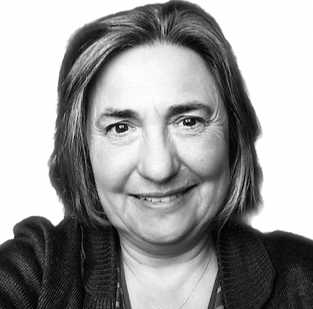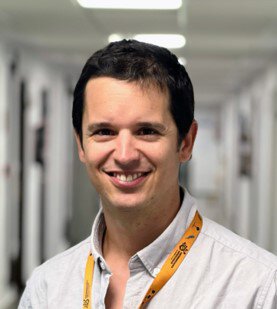At IRYCIS 6 Priority Research Areas are established and a minimum of two coordinators are assigned to each of them, with a basic mission to: i) ensure the achievement of the objectives set for their area overall; ii) guarantee communication and collaboration between the different research groups; iii) guide the emerging groups and the associate clinical researchers to achieve their progressive integration into the consolidated group level.
Microbiology, Immunology and Infection
Basic researchers and medical specialists are integrated to meet the common general objective of translational research in microbiology, immunology and infectious diseases. An omics approach is applied to the studies of microbial system models in order to optimize the diagnostic, therapeutic, prognostic and preventive approaches of infectious diseases. All this combined aims to improve the surveillance of health problems in the field of infection and also disease prevention.
Leaders
-

Dr. Rosa del Campo Moreno
She graduated in Medicine and Surgery from the University of Zaragoza (1989-1994), where she later obtained the title of Doctor in Medicine and Surgery (1998) under the supervision of Drs. Carmen Torres and Rafael Gómez-Lus. She did a postdoctoral stay (1999-2005) in the Microbiology Service of the Ramón y Cajal University Hospital, where she later became established thanks to a Miguel Servet contract (2006).
She is currently a part-time professor at the Alfonso X El Sabio University, and leads the Clinical Metagenomics group, within the Biology and Evolution of Microorganisms group in area 2. Her research lines include bacterial typing and antibiotic resistance mechanisms, as well as human microbiota and health, also leading the Faecal Transplant care program.
She is a member of the SEMiPyP Board of Directors, and has also been president of the GEMBIOTA study group at SEIMC, and treasurer of the Food Microbiology group at SEM. She has directed 17 doctoral theses already defended, published more than 250 scientific articles in indexed international journals, and has an H index of 45. Principal investigator with overlapping AES/FIS funding since 2013, she also leads Workpackage 2 of the MEPRAm Personalized Medicine project (PMP22/00092) and is Co-PI of Group CB21/13/00084 of the CIBER of Infectious Diseases (CIBERINFEC). Auditor of the ISCIII since 2024 for the accreditation of Health Research Institutes.
Contact: rosacampo@yahoo.com
Close -

Dr. Sergio Serrano Villar
Dr. Sergio Serrano is a physician specializing in infectious diseases at the Ramón y Cajal Hospital. He completed his Internal Medicine specialty at the Hospital Clínico San Carlos, where he received the Excellence Award for residents. He obtained his PhD with European mention in 2011 at the Complutense University. In 2013 and 2022, he was a visiting researcher at the University of San Francisco. In addition, he received training in clinical research through the Río Hortega and Juan Rodés programs of the Carlos III Health Institute. His two main areas of research focus on the persistence of immunological deficits in people with HIV and on the diagnostic and therapeutic potential of the microbiome.
In the field of HIV immunopathogenesis, her scientific contributions have made it possible to establish the biological significance and usefulness of two prognostic markers: the CD4/CD8 lymphocyte ratio and CD8 lymphocyte counts, as well as to better understand the effect of antiretroviral treatment on these markers (PLOS Pathogens 2014, Lancet HIV 2021, EBiomedicine 2022, Clinical Infectious Diseases 2023). This line of work has had a significant impact in the field of HIV, leading to changes in the recommendations of Spanish and European clinical practice guidelines, which facilitated her to open new lines of research and develop her group.
In the field of the microbiome, her research is aimed at finding diagnostic or therapeutic applications through the analysis of multicenter cohorts and experimental designs, including clinical trials. He was coordinator of an international ERANET-H2020 project aimed at improving the current anal cancer screening strategy by developing a tool based on microbiome changes induced by precancerous lesions associated with the papillomavirus. The findings were published in Nature Medicine in 2023, were patented and he achieved a technology transfer project in the CaixaImpulse call to develop a medical device to improve the diagnosis of high-grade anal dysplasia. Following a similar approach, he leads a large-scale project within the framework of the European EDCTP project with collaborations in Africa to identify tuberculosis biomarkers in stool, combining metagenomics, proteomics and metabolomics. In the area of therapeutic applications of the microbiome, he has led clinical trials in HIV patients aimed at understanding the immunological effects of microbiome manipulation through prebiotics, probiotics or microbiota transplants (Mucosal Immunology 2017, Nature Communications 2021, Microbiome 2024). More recently, he has expanded his areas of interest to include other projects that he coordinates in close collaboration with other areas of IRYCIS: 1) the influence of the microbiome on the response to immunotherapy in cancer patients and 2) the possibility that the microbiome hosts immunomodulatory molecules capable of improving the cytotoxic response to latent viruses.
These lines of work have been supported by competitive calls for projects and human resources at national and international level, obtaining funding in an overlapping manner. He is the author of more than 120 publications, including articles as lead author with a high citation rate, three patent applications, direction of four doctoral theses, and has received awards for young researchers (SEMI; SEIMC-GESIDA; Symposium SI) and international recognition, being regularly invited as a speaker at international scientific conferences and meetings.
Contact: sergio.serrano(ELIMINAR)@salud.madrid.org
Close
Groups
-
Infectious Diseases
Group leader:
Santiago Moreno Guillén -
Biology and Evolution of Microorganisms
Group leader:
Rafael Cantón Moreno -
Health Outcomes Research
Group leader:
Jesús María Aranaz Andrés -
Translational individualised medicine: inflammation and cancer
Group leader:
Melchor Álvarez de Mon Soto
